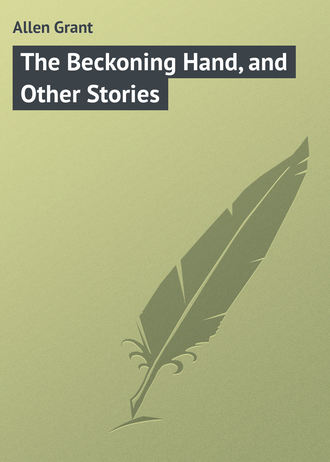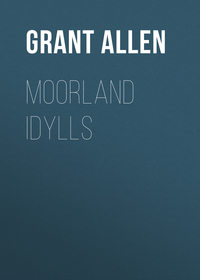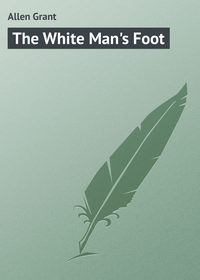 полная версия
полная версияThe Beckoning Hand, and Other Stories
I began to reflect that even a temporary prison is far from being a pleasant place for a man to stop in.
Next morning they took me up before the magistrate; and as the Museum authorities of course proved a primâ facie case against me, and as my solicitor advised me to reserve my defence, owing to the difficulty of getting up my witness from Lichfield in reasonable time, I was duly committed for trial at the next sessions of the Central Criminal Court.
I had often read before that people had been committed for trial, but till that moment I had no idea what a very unpleasant sensation it really is.
However, as I was a person of hitherto unblemished character, and wore a good coat made by a fashionable tailor, the magistrate decided to admit me to bail, if two sureties in five hundred pounds each were promptly forthcoming for the purpose. Luckily, I had no difficulty in finding friends who believed in my story; and as I felt sure the lost Wulfric would soon be found in cleaning the museum, I suffered perhaps a little less acutely than I might otherwise have done, owing to my profound confidence in the final triumph of the truth.
Nevertheless, as the case would be fully reported next morning in all the papers, I saw at once that I must go straight off and explain the matter without delay to Emily.
I will not dwell upon that painful interview. I will only say that Emily behaved as I of course knew she would behave. She was horrified and indignant at the dreadful accusation; and, woman like, she was very angry with the superintendent. "He ought to have taken your word for it, naturally, Harold," she cried through her tears. "But what a good thing, anyhow, that you happened to show the coin to me. I should recognize it anywhere among ten thousand."
"That's well, darling," I said, trying to kiss away her tears and cheer her up a little. "I haven't the slightest doubt that when the trial comes we shall be able triumphantly to vindicate me from this terrible, groundless accusation."
IV
When the trial did actually come on, the Museum authorities began by proving their case against me in what seemed the most horribly damning fashion. The superintendent proved that on such and such a day, in such and such a case, he had seen a gold coin of Wulfric of Mercia, the property of the Museum. He and Mactavish detailed the circumstances under which the coin was lost. The superintendent explained how he had asked me to submit to a search, and how, to avoid that indignity, I had myself produced from my waistcoat-pocket a gold coin of Wulfric of Mercia, which I asserted to be a duplicate specimen, and my own property. The counsel for the Crown proceeded thus with the examination: —
"Do you recognize the coin I now hand you?"
"I do."
"What is it?"
"The unique gold coin of Wulfric of Mercia, belonging to the Museum."
"You have absolutely no doubt as to its identity?"
"Absolutely none whatsoever."
"Does it differ in any respect from the same coin as you previously saw it?"
"Yes. It has been clipped round the edge with a sharp instrument, and a slight dent has been made by pressure on the obverse side, just below the W of Wulfric."
"Did you suspect the prisoner at the bar of having mutilated it?"
"I did, and I asked him whether he had a knife in his possession. He answered no. I then asked him whether he would submit to be searched for a knife. He consented, and on my looking in his pocket I found the pair of nail-scissors I now produce, with a small file on either side."
"Do you believe the coin might have been clipped with those scissors?"
"I do. The gold is very soft, having little alloy in its composition; and it could easily be cut by a strong-wristed man with a knife or scissors."
As I listened, I didn't wonder that the jury looked as if they already considered me guilty: but I smiled to myself when I thought how utterly Emily's and the ploughman's evidence would rebut this unworthy suspicion.
The next witness was the Museum cleaner. His evidence at first produced nothing fresh, but just at last, counsel set before him a paper, containing a few scraps of yellow metal, and asked him triumphantly whether he recognized them. He answered yes.
There was a profound silence. The court was interested and curious. I couldn't quite understand it all, but I felt a terrible sinking.
"What are they?" asked the hostile barrister.
"They are some fragments of gold which I found in shaking the cocoa-nut matting on the floor of gallery 27 the Saturday after the attempted theft."
I felt as if a mine had unexpectedly been sprung beneath me. How on earth those fragments of soft gold could ever have got there I couldn't imagine; but I saw the damaging nature of this extraordinary and inexplicable coincidence in half a second.
My counsel cross-examined all the witnesses for the prosecution, but failed to elicit anything of any value from any one of them. On the contrary, his questions put to the metallurgist of the Mint, who was called to prove the quality of the gold, only brought out a very strong opinion to the effect that the clippings were essentially similar in character to the metal composing the clipped Wulfric.
No wonder the jury seemed to think the case was going decidedly against me.
Then my counsel called his witnesses. I listened in the profoundest suspense and expectation.
The first witness was the ploughman from Lichfield. He was a well-meaning but very puzzle-headed old man, and he was evidently frightened at being confronted by so many clever wig-wearing barristers.
Nevertheless, my counsel managed to get the true story out of him at last with infinite patience, dexterity, and skill. The old man told us finally how he had found the coins and sold them to me for five pounds; and how one of them was of gold, with a queer head and goggle eyes pointed full face upon its surface.
When he had finished, the counsel for the Crown began his cross-examination. He handed the ploughman a gold coin. "Did you ever see that before?" he asked quietly.
"To be sure I did," the man answered, looking at it open-mouthed.
"What is it?"
"It's the bit I sold Mr. Tait there – the bit as I got out o' the old basin."
Counsel turned triumphantly to the judge. "My lord," he said, "this thing to which the witness swears is a gold piece of Ethelwulf of Wessex, by far the commonest and cheapest gold coin of the whole Anglo-Saxon period."
It was handed to the jury side by side with the Wulfric of Mercia; and the difference, as I knew myself, was in fact extremely noticeable. All that the old man could have observed in common between them must have been merely the archaic Anglo-Saxon character of the coinage.
As I heard that, I began to feel that it was really all over.
My counsel tried on the re-examination to shake the old man's faith in his identification, and to make him transfer his story to the Wulfric which he had actually sold me. But it was all in vain. The ploughman had clearly the dread of perjury for ever before his eyes, and wouldn't go back for any consideration upon his first sworn statement. "No, no, mister," he said over and over again in reply to my counsel's bland suggestion, "you ain't going to make me forswear myself for all your cleverness."
The next witness was Emily. She went into the box pale and red-eyed, but very confident. My counsel examined her admirably; and she stuck to her point with womanly persistence, that she had herself seen the clipped Wulfric, and no other coin, on the morning of the supposed theft. She knew it was so, because she distinctly remembered the inscription, "Wulfric Rex," and the peculiar way the staring open eyes were represented with barbaric puerility.
Counsel for the Crown would only trouble the young lady with two questions. The first was a painful one, but it must be asked in the interests of justice. Were she and the prisoner at the bar engaged to be married to one another?
The answer came, slowly and timidly, "Yes."
Counsel drew a long breath, and looked her hard in the face. Could she read the inscription on that coin now produced? – handing her the Ethelwulf.
Great heavens! I saw at once the plot to disconcert her, but was utterly powerless to warn her against it.
Emily looked at it long and steadily. "No," she said at last, growing deadly pale and grasping the woodwork of the witness-box convulsively; "I don't know the character in which it is written."
Of course not: for the inscription was in the peculiar semi-runic Anglo-Saxon letters! She had never read the words "Wulfric Rex" either. I had read them to her, and she had carried them away vaguely in her mind, imagining no doubt that she herself had actually deciphered them.
There was a slight pause, and I felt my blood growing cold within me. Then the counsel for the Crown handed her again the genuine Wulfric, and asked her whether the letters upon it which she professed to have read were or were not similar to those of the Ethelwulf.
Instead of answering, Emily bent down her head between her hands, and burst suddenly into tears.
I was so much distressed at her terrible agitation that I forgot altogether for the moment my own perilous position, and I cried aloud, "My lord, my lord, will you not interpose to spare her any further questions?"
"I think," the judge said to the counsel for the Crown, "you might now permit the witness to stand down."
"I wish to re-examine, my lord," my counsel put in hastily.
"No," I said in his ear, "no. Whatever comes of it, not another question. I had far rather go to prison than let her suffer this inexpressible torture for a single minute longer."
Emily was led down, still crying bitterly, into the body of the court, and the rest of the proceedings went on uninterrupted.
The theory of the prosecution was a simple and plausible one. I had bought a common Anglo-Saxon coin, probably an Ethelwulf, valued at about twenty-two shillings, from the old Lichfield ploughman. I had thereupon conceived the fraudulent idea of pretending that I had a duplicate of the rare Wulfric. I had shown the Ethelwulf, clipped in a particular fashion, to the lady whom I was engaged to marry. I had then defaced and altered the genuine Wulfric at the Museum into the same shape with the aid of my pocket nail-scissors. And I had finally made believe to drop the coin accidentally upon the floor, while I had really secreted it in my waistcoat pocket. The theory for the defence had broken down utterly. And then there was the damning fact of the gold scrapings found in the cocoa-nut matting of the British Museum, which was to me the one great inexplicable mystery in the whole otherwise comprehensible mystification.
I felt myself that the case did indeed look very black against me. But would a jury venture to convict me on such very doubtful evidence?
The jury retired to consider their verdict. I stood in suspense in the dock, with my heart loudly beating. Emily remained in the body of the court below, looking up at me tearfully and penitently.
After twenty minutes the jury retired.
"Guilty or not guilty?"
The foreman answered aloud, "Guilty."
There was a piercing cry in the body of the court, and in a moment Emily was carried out half fainting and half hysterical.
The judge then calmly proceeded to pass sentence. He dwelt upon the enormity of my crime in one so well connected and so far removed from the dangers of mere vulgar temptations. He dwelt also upon the vandalism of which I had been guilty – myself a collector – in clipping and defacing a valuable and unique memorial of antiquity, the property of the nation. He did not wish to be severe upon a young man of hitherto blameless character; but the national collection must be secured against such a peculiarly insidious and cunning form of depredation. The sentence of the court was that I should be kept in —
Five years' penal servitude.
Crushed and annihilated as I was, I had still strength to utter a single final word. "My lord," I cried, "the missing Wulfric will yet be found, and will hereafter prove my perfect innocence."
"Remove the prisoner," said the judge, coldly.
They took me down to the courtyard unresisting, where the prison van was standing in waiting.
On the steps I saw Emily and her mother, both crying bitterly. They had been told the sentence already, and were waiting to take a last farewell of me.
"Oh, Harold!" Emily cried, flinging her arms around me wildly, "it's all my fault! It's my fault only! By my foolish stupidity I've lost your case. I've sent you to prison. Oh, Harold, I can never forgive myself. I've sent you to prison. I've sent you to prison."
"Dearest," I said, "it won't be for long. I shall soon be free again. They'll find the Wulfric sooner or later, and then of course they'll let me out again."
"Harold," she cried, "oh, Harold, Harold, don't you see? Don't you understand? This is a plot against you. It isn't lost. It isn't lost. That would be nothing. It's stolen; it's stolen!"
A light burst in upon me suddenly, and I saw in a moment the full depth of the peril that surrounded me.
PART II
I
It was some time before I could sufficiently accustom myself to my new life in the Isle of Portland to be able to think clearly and distinctly about the terrible blow that had fallen upon me. In the midst of all the petty troubles and discomforts of prison existence, I had no leisure at first fully to realize the fact that I was a convicted felon with scarcely a hope – not of release; for that I cared little – but of rehabilitation.
Slowly, however, I began to grow habituated to the new hard life imposed upon me, and to think in my cell of the web of circumstance which had woven itself so irresistibly around me.
I had only one hope. Emily knew I was innocent. Emily suspected, like me, that the Wulfric had been stolen. Emily would do her best, I felt certain, to heap together fresh evidence, and unravel this mystery to its very bottom.
Meanwhile, I thanked Heaven for the hard mechanical daily toil of cutting stone in Portland prison. I was a strong athletic young fellow enough. I was glad now that I had always loved the river at Oxford; my arms were stout and muscular. I was able to take my part in the regular work of the gang to which I belonged. Had it been otherwise – had I been set down to some quiet sedentary occupation, as first-class misdemeanants often are, I should have worn my heart out soon with thinking perpetually of poor Emily's terrible trouble.
When I first came, the Deputy-Governor, knowing my case well (had there not been leaders about me in all the papers?), very kindly asked me whether I would wish to be given work in the book-keeping department, where many educated convicts were employed as clerks and assistants. But I begged particularly to be put into an outdoor gang, where I might have to use my limbs constantly, and so keep my mind from eating itself up with perpetual thinking. The Deputy-Governor immediately consented, and gave me work in a quarrying gang, at the west end of the island, near Deadman's Bay on the edge of the Chesil.
For three months I worked hard at learning the trade of a quarryman, and succeeded far better than any of the other new hands who were set to learn at the same time with me. Their heart was not in it; mine was. Anything to escape that gnawing agony.
The other men in the gang were not agreeable or congenial companions. They taught me their established modes of intercommunication, and told me several facts about themselves, which did not tend to endear them to me. One of them, 1247, was put in for the manslaughter of his wife by kicking; he was a low-browed, brutal London drayman, and he occupied the next cell to mine, where he disturbed me much in my sleepless nights by his loud snoring. Another, a much slighter and more intelligent-looking man, was a skilled burglar, sentenced to fourteen years for "cracking a crib" in the neighbourhood of Hampstead. A third was a sailor, convicted of gross cruelty to a defenceless Lascar. They all told me the nature of their crimes with a brutal frankness which fairly surprised me; but when I explained to them in return that I had been put in upon a false accusation, they treated my remarks with a galling contempt that was absolutely unsupportable. After a short time I ceased to communicate with my fellow-prisoners in any way, and remained shut up with my own thoughts in utter isolation.
By-and-by I found that the other men in the same gang were beginning to dislike me strongly, and that some among them actually whispered to one another – what they seemed to consider a very strong point indeed against me – that I must really have been convicted by mistake, and that I was a regular stuck-up sneaking Methodist. They complained that I worked a great deal too hard, and so made the other felons seem lazy by comparison; and they also objected to my prompt obedience to our warder's commands, as tending to set up an exaggerated and impossible standard of discipline.
Between this warder and myself, on the other hand, there soon sprang up a feeling which I might almost describe as one of friendship. Though by the rules of the establishment we could not communicate with one another except upon matters of business, I liked him for his uniform courtesy, kindliness, and forbearance; while I could easily see that he liked me in return, by contrast with the other men who were under his charge. He was one of those persons whom some experience of prisons then and since has led me to believe less rare than most people would imagine – men in whom the dreary life of a prison warder, instead of engendering hardness of heart and cold unsympathetic sternness, has engendered a certain profound tenderness and melancholy of spirit. I grew quite fond of that one honest warder, among so many coarse and criminal faces; and I found, on the other hand, that my fellow-prisoners hated me all the more because, as they expressed it in their own disgusting jargon, I was sucking up to that confounded dog of a barker. It happened once, when I was left for a few minutes alone with the warder, that he made an attempt for a moment, contrary to regulations, to hold a little private conversation with me.
"1430," he said in a low voice, hardly moving his lips, for fear of being overlooked, "what is your outside name?"
I answered quietly, without turning to look at him, "Harold Tait."
He gave a little involuntary start. "What!" he cried. "Not him that took a coin from the British Museum?"
I bridled up angrily. "I did not take it," I cried with all my soul. "I am innocent, and have been put in here by some terrible error."
He was silent for half a second. Then he said musingly, "Sir, I believe you. You are speaking the truth. I will do all I can to make things easy for you."
That was all he said then. But from that day forth he always spoke to me in private as "Sir," and never again as "1430."
An incident arose at last out of this condition of things which had a very important effect upon my future position.
One day, about three months after I was committed to prison, we were all told off as usual to work in a small quarry on the cliff-side overhanging the long expanse of pebbly beach known as the Chesil. I had reason to believe afterwards that a large open fishing boat lying upon the beach below at the moment had been placed there as part of a concerted scheme by the friends of the Hampstead burglar; and that it contained ordinary clothing for all the men in our gang, except myself only. The idea was evidently that the gang should overpower the warder, seize the boat, change their clothes instantly, taking turns about meanwhile with the navigation, and make straight off for the shore at Lulworth, where they could easily disperse without much chance of being recaptured. But of all this I was of course quite ignorant at the time, for they had not thought well to intrust their secret to the ears of the sneaking virtuous Methodist.
A few minutes after we arrived at the quarry, I was working with two other men at putting a blast in, when I happened to look round quite accidentally, and to my great horror, saw 1247, the brutal wife-kicker, standing behind with a huge block of stone in his hands, poised just above the warder's head, in a threatening attitude. The other men stood around waiting and watching. I had only just time to cry out in a tone of alarm, "Take care, warder, he'll murder you!" when the stone descended upon the warder's head, and he fell at once, bleeding and half senseless, upon the ground beside me. In a second, while he shrieked and struggled, the whole gang was pressing savagely and angrily around him.
There was no time to think or hesitate. Before I knew almost what I was doing, I had seized his gun and ammunition, and, standing over his prostrate body, I held the men at bay for a single moment. Then 1247 advanced threateningly, and tried to put his foot upon the fallen warder.
I didn't wait or reflect one solitary second. I drew the trigger, and fired full upon him. The bang sounded fiercely in my ears, and for a moment I could see nothing through the smoke of the rifle.
With a terrible shriek he fell in front of me, not dead, but seriously wounded.
"The boat, the boat," the others cried loudly. "Knock him down! Kill him! Take the boat, all of you."
At that moment the report of my shot had brought another warder hastily to the top of the quarry.
"Help, help!" I cried. "Come quick, and save us. These brutes are trying to murder our warder!"
The man rushed back to call for aid; but the way down the zigzag path was steep and tortuous, and it was some time before they could manage to get down and succour us.
Meanwhile the other convicts pressed savagely around us, trying to jump upon the warder's body and force their way past to the beach beneath us. I fired again, for the rifle was double-barrelled; but it was impossible to reload in such a tumult, so, after the next shot, which hit no one, I laid about me fiercely with the butt end of the gun, and succeeded in knocking down four of the savages, one after another. By that time the warders from above had safely reached us, and formed a circle of fixed bayonets around the rebellious prisoners.
"Thank God!" I cried, flinging down the rifle, and rushing up to the prostrate warder. "He is still alive. He is breathing! He is breathing!"
"Yes," he murmured in a faint voice, "I am alive, and I thank you for it. But for you, sir, these fellows here would certainly have murdered me."
"You are badly wounded yourself, 1430," one of the other warders said to me, as the rebels were rapidly secured and marched off sullenly back to prison. "Look, your own arm is bleeding fiercely."
Then for the first time I was aware that I was one mass of wounds from head to foot, and that I was growing faint from loss of blood. In defending the fallen warder I had got punched and pummelled on every side, just the same as one used to get long ago in a bully at football when I was a boy at Rugby, only much more seriously.
The warders brought down seven stretchers: one for me; one for the wounded warder; one for 1247, whom I had shot; and four for the convicts whom I had knocked over with the butt end of the rifle. They carried us up on them, strongly guarded, in a long procession.
At the door of the infirmary the Governor met us. "1430," he said to me, in a very kind voice, "you have behaved most admirably. I saw you myself quite distinctly from my drawing-room windows. Your bravery and intrepidity are well deserving of the highest recognition."
"Sir," I answered, "I have only tried to do my duty. I couldn't stand by and see an innocent man murdered by such a pack of bloodthirsty ruffians."
The Governor turned aside a little surprised. "Who is 1430?" he asked quietly.
A subordinate, consulting a book, whispered my name and supposed crime to him confidentially. The Governor nodded twice, and seemed to be satisfied.
"Sir," the wounded warder said faintly from his stretcher, "1430 is an innocent man unjustly condemned, if ever there was one."
II
On the Thursday week following, when my wounds were all getting well, the whole body of convicts was duly paraded at half-past eleven in front of the Governor's house.









